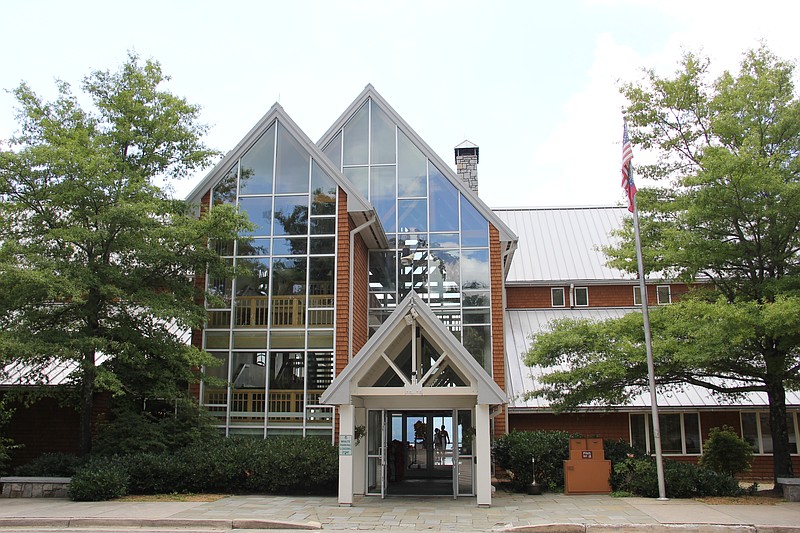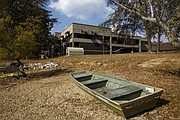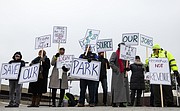Once you make enjoyment of state parks a function of the thickness of your billfold, at that point the parks become a rich man's playground and poor folks can stay at home.
Rooms with king beds at the Amicalola Falls State Park lodge near Ellijay, Ga., are going for $79 a night during the middle of the week in January.
Staying in the same room on the third weekend of October will cost you $279, a glance at the lodge's rates show.
With the lodge now under private management, rates can climb higher than what the state may have previously charged, especially during peak times like fall weekends, said Bill Donohue, executive director of the state's North Georgia Mountains Authority.
The price differences reflect an aggressive shift toward demand pricing and are one example of the corporate strategy that a private company could bring to Tennessee if the state finds one to run hospitality services at Fall Creek Falls State Park in Spencer.
"They [private companies] will try and make money for the owner," Donohue said. "They do a good job with that. Therefore, there's probably times where some may think the price-value relationship is pushed beyond where it needs to be in some people's eyes."
The way Donohue sees it, there are some services state governments are well-equipped to offer, such as roads provided by a department of transportation. Hotels, however, are a service best left to the private sector, said Donohue, who oversaw the privatization of lodges and golf courses at five Georgia state parks in 2013.
The early results, he said, have been positive, and they offer a glimpse into waters that Tennessee is testing with an attempt to demolish, rebuild and privatize the inn and conference center at Fall Creek Falls.
"To me," Donohue said, "the state running our facilities was a limiting factor."
Others, though, see privatization as a public land giveaway that can price ordinary citizens out of the parks.
***
Former Alabama conservation commissioner Charley Grimsley, a full-throated opponent of privatization, calls it a means for politicians to solve fiscal issues they have created by underfunding parks.
"It's a manufactured crisis," said Grimsley, who oversaw Alabama State Parks from 1993-95. "That's what we're seeing with public lands all over the United States, and it's to line the pockets of their cronies. That's what's behind it.
"If you're a rich man and can sit on the balcony, smoke Cuban cigars, drink martinis and flick your ashes on the little people that walk by, if that's what you want, that's what you're going to get.
"Once you make enjoyment of state parks a function of the thickness of your billfold, at that point the parks become a rich man's playground, and poor folks can stay at home."
A March 2016 report prepared for the state of Tennessee by Goodwyn Mills & Cawood Inc. and IDM Hospitality recommended a new "upscale" inn designed in a modern, rustic style and offering expansive views of the lake.
"With a new facility, not only is it possible to increase occupancy rates but the average [room] rates, as well," the report said.
The state issued a request for proposals that attracted five companies to tour Fall Creek Falls earlier this month. The request highlighted how the average room rate could rise from $76 to $151 per night at a new, privately managed Fall Creek Falls Inn and Conference Center that would be finished by 2020.
Fall Creek Falls is the largest and most visited of Tennessee's 54 state parks. It covers more than 26,000 acres in Van Buren and Bledsoe counties, both labeled economically distressed by the Appalachian Regional Commission.
Southern states have toyed more frequently with privatization since the Great Recession led to funding reductions for already tight-budgeted park systems. Those systems compete with other state agencies for money from governors and lawmakers each year.
Privatization advocates see bringing in companies to run state park hotels, spas, golf courses and cabins as a way to save taxpayer money and reinvigorate aging park facilities by providing high-quality accommodations. State officials also note that a rate increase would mean more hotel/motel tax and sales tax revenue for the area, although there would be substantially fewer rooms at the new facility.
Tennessee is poised to pay up to $22.1 million for the new inn at Fall Creek Falls. The state would own the facility and contract with a private company to run it.
The move would affect dozens of state employees, some of whom could be without work during construction and would likely have fewer benefits if hired by the new company.
***
Grimsley fears Alabama could move toward privatization at its state parks after the November passage of the state's Amendment 2.
Primarily, the amendment prevents the state Legislature from redirecting state park funds to other government projects. But it also allows the state to hire vendors at parks where privatization was previously restricted because of a nearly 20-year-old bond issue.
"It [Amendment 2] has not created a dramatic change in our approach to how we execute park operations through concession agreements, and it has not threatened our parks with being 'privatized,'" Alabama State Parks director Greg Lein said.
Lein said his department, which runs five state park inns, is considering "concession concepts" for a golf course that is now closed, one food service operation and some new amenities such as rental cabins at campgrounds.
The state already used vendors for services such as canoe and kayak rentals at other parks that weren't a part of the bond issue.
Alabama was already planning to privatize operations at a new inn at Gulf State Park in Gulf Shores that is replacing a lodge hit by Hurricane Ivan in 2004. But Lein said that's because the beach-area tourism market is so competitive that the state cannot compete on staff wages for that facility.
AL.com reported in August that the hotel will be named, "The Lodge at Gulf State Park, a Hilton Hotel."
"You think the little man can afford to stay at a Hilton on the beach?" Grimsley said. "Well, if you're the Trump family or the Rockefellers, you might be able to afford it. But if you're the Smiths or Joneses, you're not going to be able to afford it."
***
Georgia's move toward privatization came as state figures showed two of its largest lodges at Unicoi State Park and Amicalola Falls losing profitability.
Figures from the North Georgia Mountains Authority show the two lodges lost $261,000 in fiscal 2014. Florida-based Coral Hospitality signed a management agreement in 2015, and the lodges made $500,000 in fiscal 2016, according to the authority's numbers. That figure could rise to $1 million this year, Donohue said.
Georgia invested about $10 million in the two facilities before Coral Hospitality took over.
"It's important that you improve facilities," Donohue said. "With private sector hotels, in my opinion, it's not magic. They don't walk in with fairy dust. You've got to have a good facility with new, modern amenities, look and appeal that guests expect when they walk in the door."
Coral Hospitality is paying Georgia 2.75 percent of gross revenue during the agreement's first three years and 3 percent during years four and five.
Tennessee is proposing a contract expiring at the end of 2029 and asking a minimum of 4.5 percent of gross annual revenue from hospitality services. The state also proposes the vendor put aside a minimum of 3 percent of annual revenue to build a maintenance reserve.
State officials say the maintenance stipulation is a way to ensure the new facility gets updated. Occupancy rates at the Fall Creek Falls Inn and Conference Center have dipped in recent years, and even privatization opponents agree it needs a face lift.
A 2015 attempt to privatize Fall Creek Falls' hospitality services failed when no bids were submitted because of the park's poor condition.
Gov. Bill Haslam then proposed $21.65 million in the 2016-17 budget to improve the park's hospitality services. But some, like Tennessee State Employees Association Executive Director Randy Stamps and Van Buren County mayor Greg Wilson, have said it was not clear to legislators that the state planned to attempt privatization again.
If the request for proposals goes according to schedule at Fall Creek Falls, demolition of the inn could begin by the end of the year.
"I just pray some champions in the state of Tennessee arise, draw a line in the sand and don't let the first domino fall," Grimsley said.
Donohue, of Georgia, maintains that privatization has been a good deal for his state.
"Over the last couple years we've invested more than twenty million dollars in those five parks," he said. "You couple that with the marketing, staffing and operational abilities of a private company, and the overall financial results have been very encouraging."
Contact staff writer David Cobb at dcobb@timesfreepress.com or 423-757-6249.


